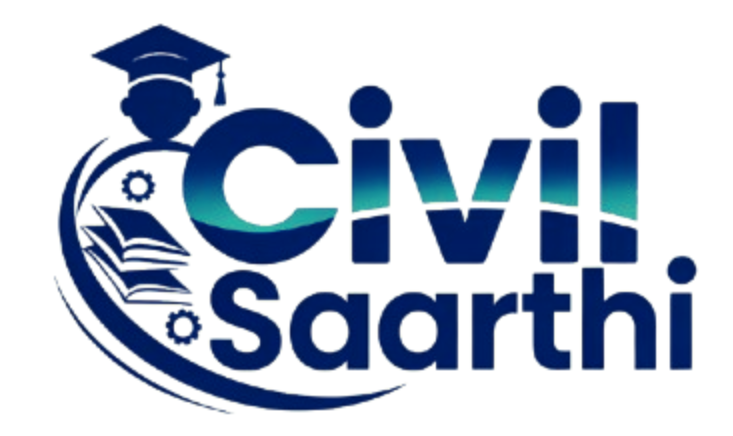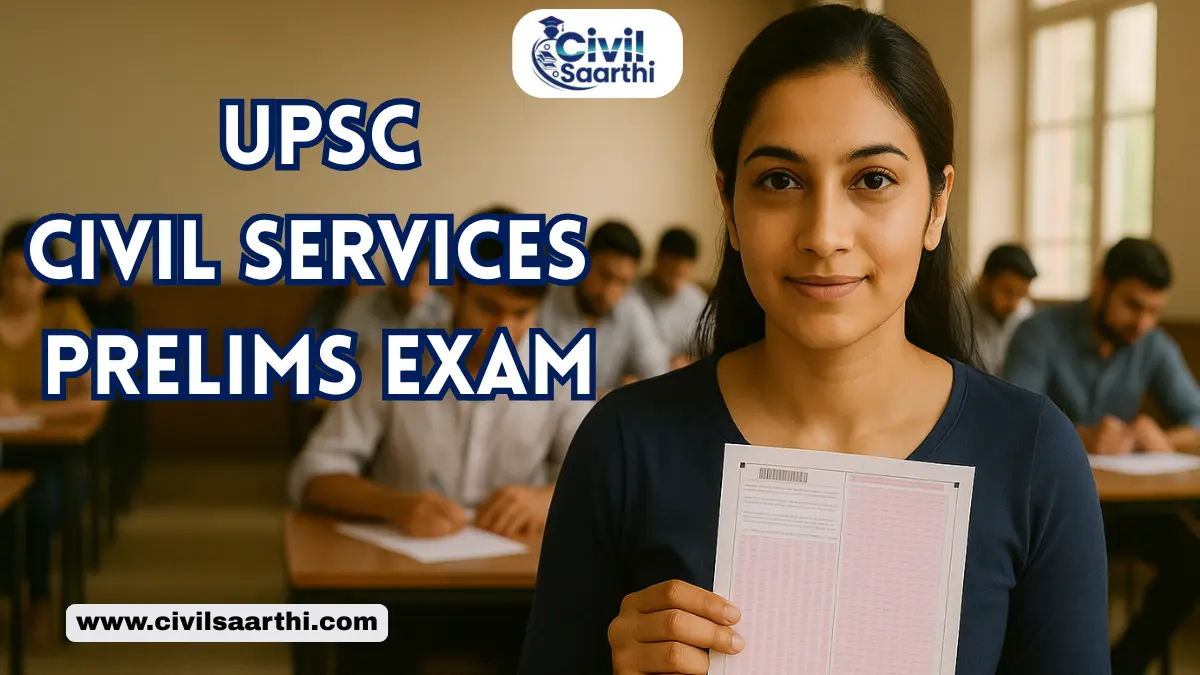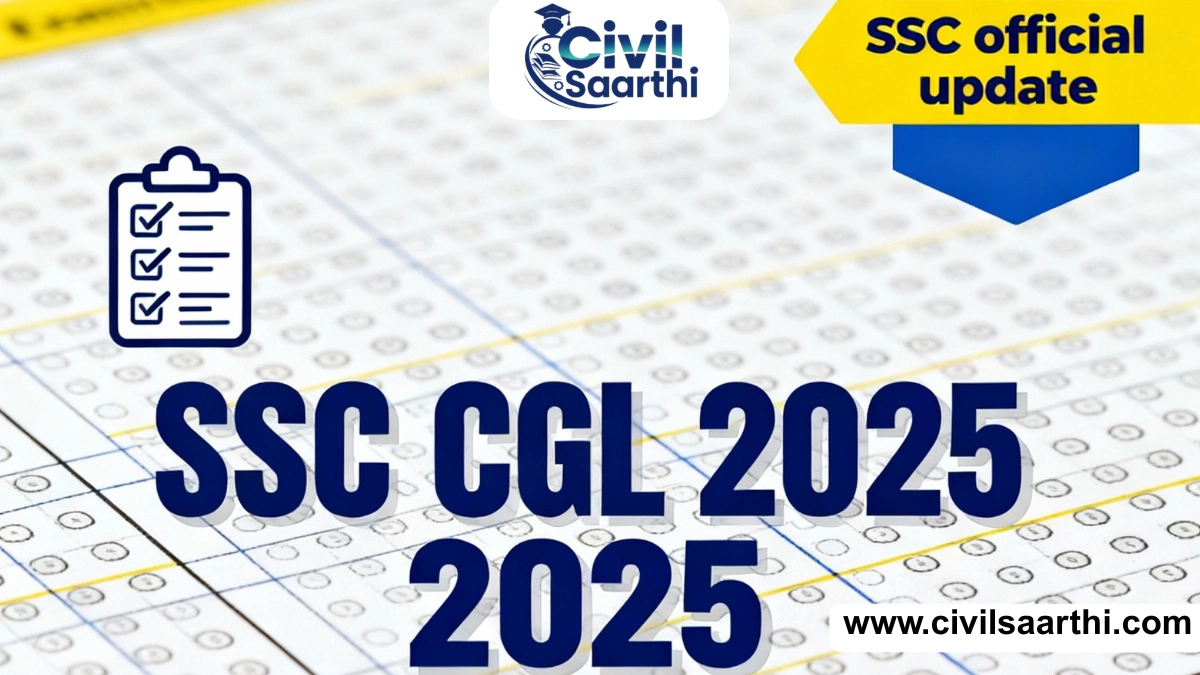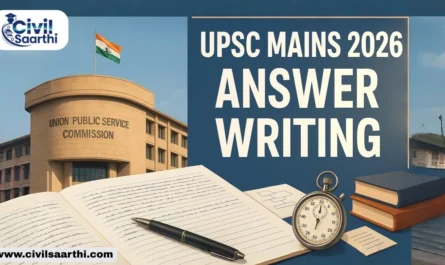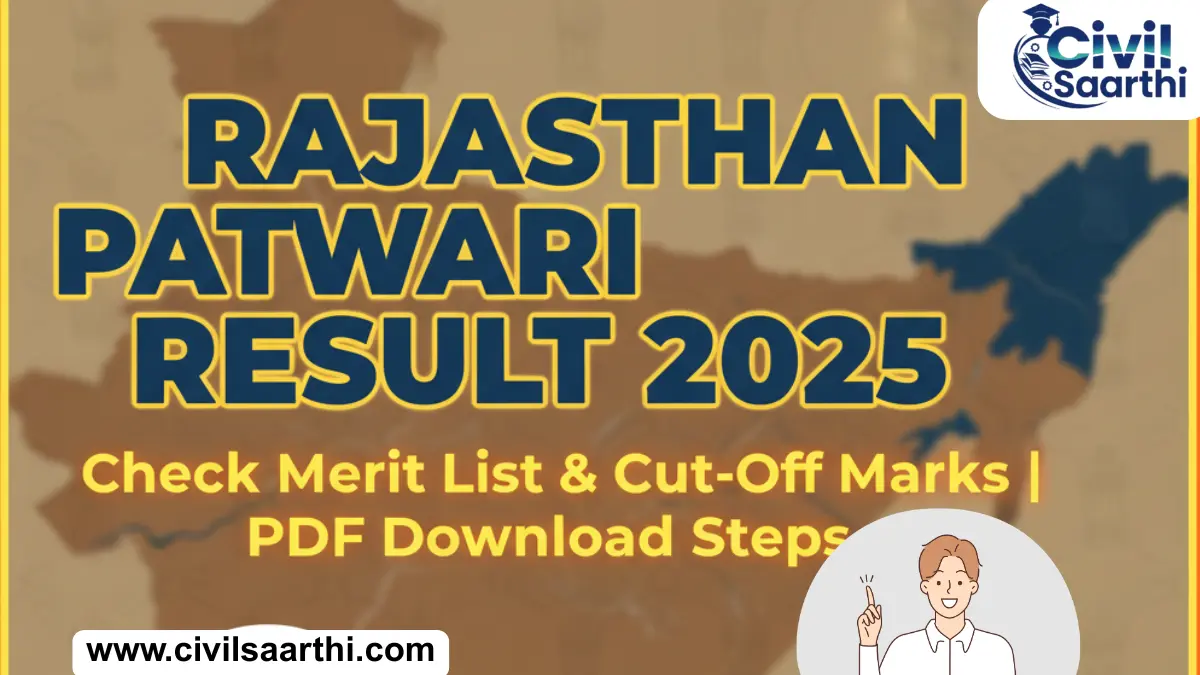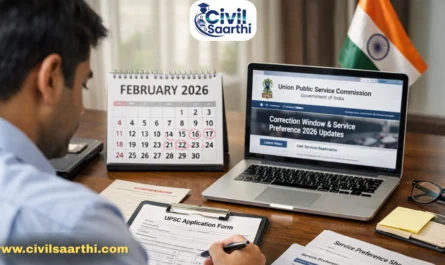The UPSC Civil Services Prelims Exam is the first stage of the IAS, IPS selection process. It consists of two objective-type papers: General Studies Paper I and CSAT (Paper II). Paper I tests current affairs, history, geography, polity, economy, and environment, while CSAT evaluates comprehension, reasoning, and basic numeracy. The exam is qualifying in nature for CSAT and merit-ranking for GS Paper I. Read the article below for more details related to the UPSC Civil Services Prelims Exam.
UPSC Civil Services Prelims Exam
The UPSC Civil Services Prelims Exam is the first stage of India’s prestigious IAS selection process, conducted annually by the Union Public Service Commission. It comprises two objective-type papers: General Studies Paper I and CSAT (Paper II), each carrying 200 marks. While Paper I determines merit ranking, Paper II is qualifying in nature with a minimum requirement of 33%.
UPSC Civil Services Prelims Exam Overview
A quick and comprehensive overview of the UPSC Prelims exam structure and key details:
UPSC Civil Services Prelims Exam Overview | |
| Exam Name | UPSC Civil Services Preliminary Examination |
| Conducting Body | Union Public Service Commission (UPSC) |
| Exam Level | National |
| Stage | First stage of the UPSC Civil Services Examination |
| Papers | Two: General Studies Paper I and CSAT (Paper II) |
| Total Marks | 200 marks each (total 400 marks) |
| Question Type | Objective (Multiple Choice Questions) |
| Duration | 2 hours for each paper |
| Medium of Exam | English and Hindi |
| Qualifying Marks for CSAT | 33% (66 marks) |
| Negative Marking | Yes, 1/3rd of the marks deducted for each wrong answer |
| Prelims Result Use | Screening for UPSC Mains; not counted in final merit |
| Exam Date 2026 | May 24, 2026 (Sunday) |
| Official Website | upsc.gov.in |
UPSC Civil Services Prelims Exam Date 2026
The UPSC Civil Services Prelims 2026 is scheduled to be conducted on May 24, 2026, as per the official UPSC Calendar 2026. This date marks the beginning of the highly competitive IAS selection process. Candidates must complete their application process by February 3, 2026, following the release of the notification on January 14, 2026. Early awareness of the Prelims Exam Date 2026 allows aspirants to streamline their preparation effectively.
UPSC Civil Services Prelims Exam Pattern
The UPSC Civil Services Prelims Exam consists of two objective-type papers: General Studies Paper I and CSAT (Paper II). While GS Paper I counts for merit, CSAT is qualifying in nature.
UPSC Civil Services Prelims Exam Pattern | |||||
| Paper | Subject | Duration | Total Marks | Type of Questions | Qualifying Marks |
| Paper 1 | General Studies (GS) | 2 hours | 200 | Objective (MCQs) | Based on cut-off |
| Paper 2 | CSAT (Aptitude Test) | 2 hours | 200 | Objective (MCQs) | 33% (66.66 marks) |
UPSC Civil Services Prelims Syllabus
The UPSC Civil Services Prelims Exam consists of two papers: General Studies Paper I and CSAT (Paper II), both objective-type and carrying 200 marks each. While Paper I counts for merit, Paper II is qualifying in nature, requiring 33% to pass.
UPSC Civil Services Prelims GS Paper 1
This paper is designed to assess a candidate’s knowledge and understanding of various subjects. It is the most crucial paper as it helps candidates qualify for the Mains exam. The syllabus for GS Paper 1 includes the following topics:
- Current events of national and international importance
- History of India and Indian National Movement
- Indian and World Geography – Physical, Social, and Economic Geography of India and the World
- Indian Polity and Governance – Constitution, Political System, Panchayati Raj, Public Policy, Rights Issues, etc.
- Economic and Social Development – Sustainable Development, Poverty, Inclusion, Demographics, Social Sector Initiatives, etc.
- General issues on Environmental Ecology, Biodiversity, and Climate Change – that do not require subject specialization
- General Science
UPSC Civil Services Prelims GS Paper 2 CSAT
The UPSC Civil Services Prelims General Studies Paper 2 (CSAT) is designed to test a candidate’s aptitude, reasoning, and comprehension skills. This paper is qualifying in nature, and candidates must score at least 33% to clear it. The topics included in the syllabus are:
- Comprehension – Understanding and interpreting written passages
- Interpersonal Skills including Communication Skills – Evaluating social and communication abilities
- Logical Reasoning and Analytical Ability – Solving puzzles, patterns, and logic-based problems
- Decision-Making and Problem-Solving – Scenario-based questions to assess judgment and practical thinking
- General Mental Ability – Numerical reasoning and mental calculations
- Basic Numeracy (Class X level) – Includes topics like numbers, percentages, averages, ratios, time and work, and profit & loss
- Data Interpretation (Class X level) – Interpreting data presented in graphs, charts, and tables
UPSC Civil Services Prelims Booklist
The right booklist is crucial for building a strong foundation for the Prelims exam. Here’s a subject-wise table of the most recommended books by toppers and experts:
UPSC Civil Services Prelims Booklist | |
| Subject | Recommended Book |
| Polity | Indian Polity by M. Laxmikanth |
| History | NCERT History (Class 6-12), Spectrum Modern History |
| Geography | NCERT Geography (Class 6-12), GC Leong |
| Economy | Indian Economy by Nitin Singhania |
| Environment | Environment by Shankar IAS |
| Science & Tech | NCERTs + Current Affairs |
| Current Affairs | Daily newspaper (The Hindu/Indian Express), Monthly magazine |
| CSAT | CSAT Manual by TMH or CSAT by Arihant |
UPSC Prelims vs Mains: Differences in UPSC Civil Services Exam
The UPSC Civil Services Examination is conducted in three stages: Prelims, Mains, and Interview. Each stage serves a distinct purpose and follows a different pattern. Here’s a detailed comparison between the Prelims and Mains exams:
UPSC Prelims vs Mains: Differences in UPSC Civil Services Exam | ||
| Aspect | Prelims | Mains |
| Stage | First stage | Second stage |
| Purpose | Screening test for Mains | Assessing academic and analytical ability for ranking |
| Number of Papers | 2 (General Studies I and CSAT) | 9 papers (Essay, GS I-IV, 2 Optional, 2 Language Papers) |
| Type of Questions | Objective (MCQs) | Descriptive (Essay-type answers) |
| Total Marks | 400 marks (Only GS Paper I counted for cut-off) | 1750 marks (All 9 papers, excluding interview) |
| Duration | 2 hours per paper | 3 hours per paper |
| Medium of Exam | English/Hindi | English/Hindi/Regional Languages |
| Negative Marking | Yes (1/3rd deduction per wrong answer) | No negative marking |
| Qualifying Nature | Only CSAT is qualifying (33% marks required) | 2 language papers are qualifying |
| Result Usage | Used only to shortlist candidates for Mains | Used to calculate final merit along with Interview |
| Syllabus Coverage | General & current affairs-oriented | In-depth analysis, opinion, and writing skill-oriented |
UPSC Civil Services Prelims Exam: Preparation Tips
A strategic and disciplined approach is essential for cracking the UPSC Prelims. Below are key preparation tips to help aspirants stay focused and maximize their performance.
Preparation Tips:
- Understand the Syllabus: Stick to the syllabus to avoid studying irrelevant topics.
- Follow a Limited but Standard Booklist: Choose 1–2 trusted sources per subject and revise them multiple times.
- Make and Revise Short Notes: Regular revision using crisp notes boosts recall during the exam.
- Practice Previous Year Papers: Analyzing PYQs helps understand trends and difficulty level.
- Take Regular Mock Tests: Simulate exam pressure and improve time management.
- Focus on CSAT Too: Don’t neglect CSAT; regular practice ensures you clear the qualifying mark.
- Stay Updated with Current Affairs: Read newspapers and monthly compilations for GS Paper I.
- Avoid Last-Minute Overloading: Keep the final weeks for revision and mock analysis only.
UPSC Civil Services Prelims Exam FAQs
Q1. How many papers are there in the UPSC Prelims exam?
There are two papers: General Studies Paper I and CSAT (Paper II), both of 200 marks each.
Q2. Is CSAT qualifying in nature?
Yes, CSAT is qualifying. You need to score at least 33% (66 marks out of 200) to clear it.
Q3. Are marks from the Prelims counted in the final merit?
No, Prelims marks are not counted in the final merit. It is only a screening test for the Mains stage.
Q4. What is the medium of the Prelims question paper?
The question paper is available in both English and Hindi.
Q5. Can I take the Prelims exam in my regional language?
No, Prelims is conducted only in English and Hindi.
Q6. How many times can I attempt the Prelims exam?
The number of attempts varies by category: 6 for General, 9 for OBC, and unlimited for SC/ST (within age limit).
Q7. Is there negative marking in the Prelims exam?
Yes, there is 1/3rd negative marking for each wrong answer in both GS Paper I and CSAT.
Q8. How should I prepare for current affairs?
Read a national newspaper daily (like The Hindu) and follow monthly current affairs compilations from reputed sources.
Q9. When is the UPSC Prelims 2026 exam scheduled?
The UPSC Prelims 2026 exam is scheduled for May 24, 2026, as per the official calendar.
Q10. What is the age limit for appearing in the Prelims exam?
The age limit is 21-32 years for General category (with age relaxation for reserved categories).
